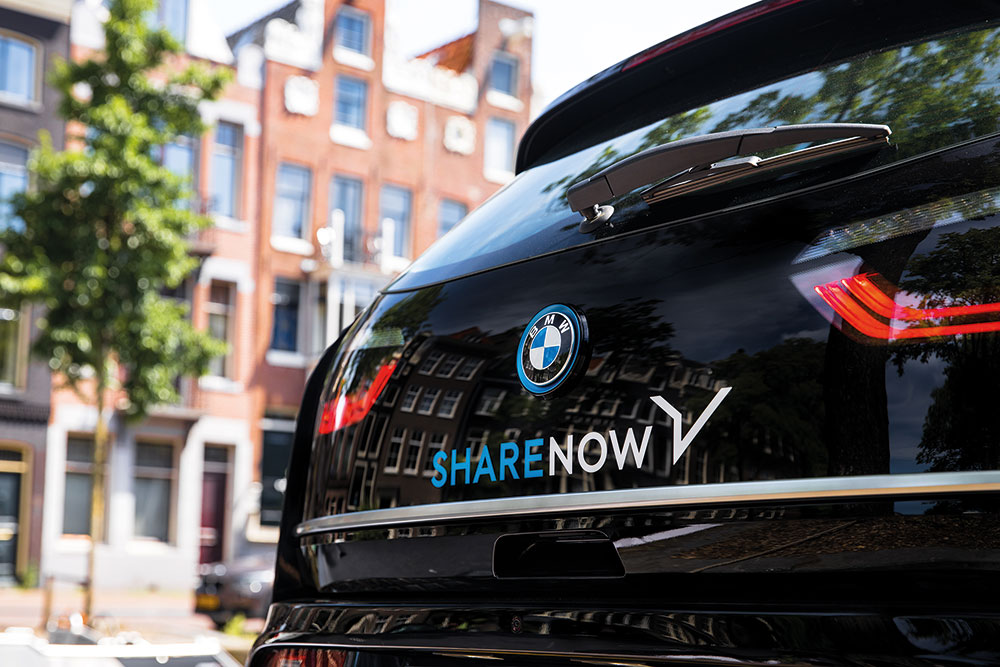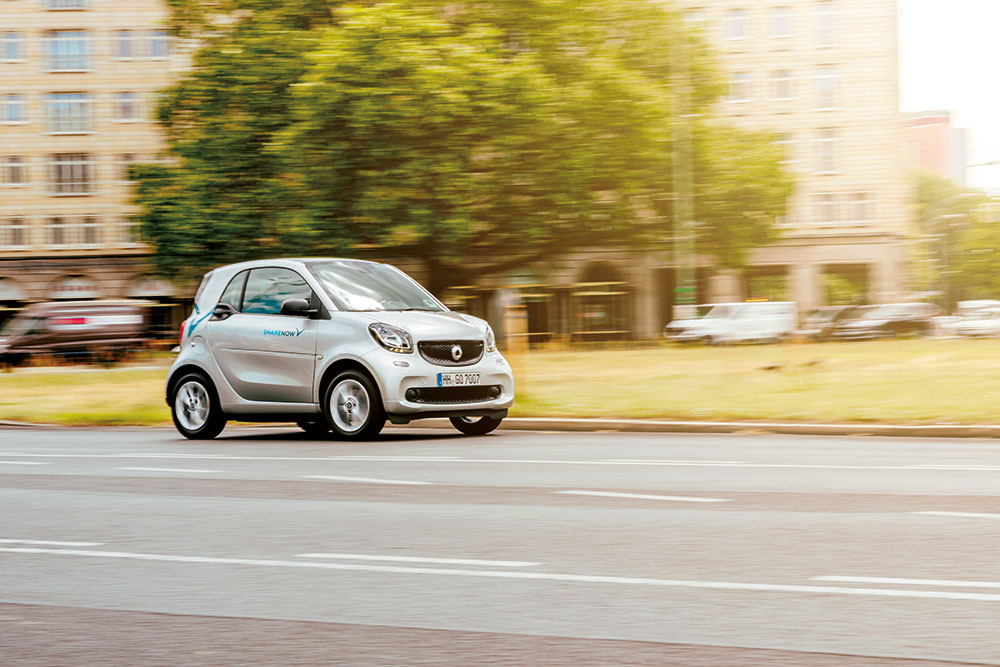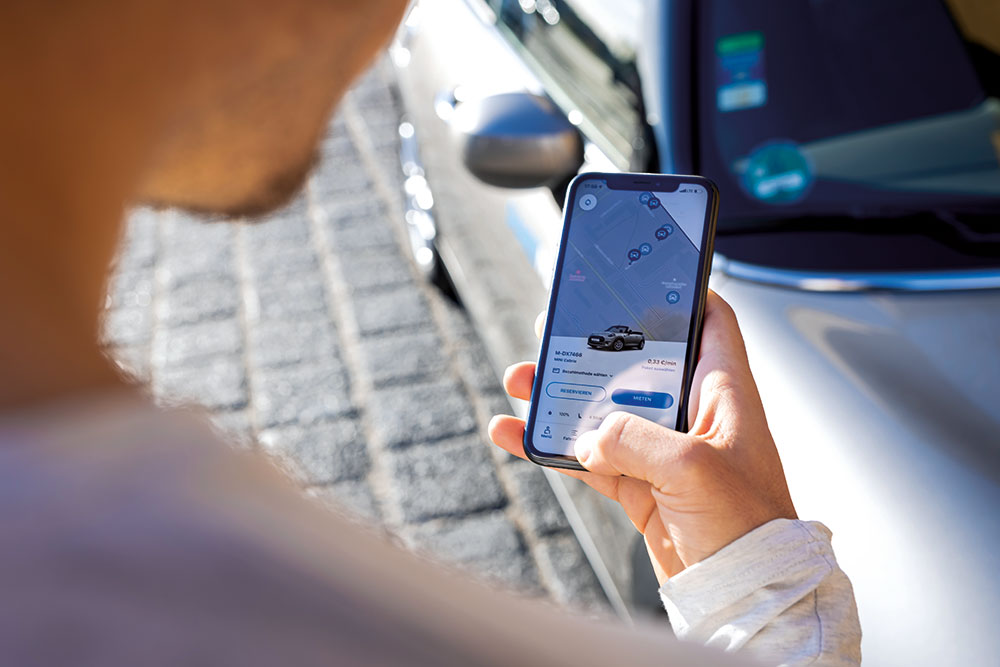SHARE NOW – Sharing is Caring, Cool, and Convenient: a Pioneer of Sustainable Urban Mobility

CEO: Olivier Reppert
SHARE NOW is a prime example of how collaboration can be more powerful than competition. SHARE NOW was born as a joint venture between two dominant original equipment manufacturers (OEMs) in Europe — Daimler and BMW — after almost a decade of rivalry.
Each had created its own car-sharing service, car2go and DriveNow, and both pioneered the business model. Since 2019, under one brand, SHARE NOW operates 11,000 vehicles throughout 16 cities in eight countries across Europe. More than 25 percent of the fleet is electric, making the company the continent’s largest operator of an electric, free-floating, car-sharing enterprise.
How SHARE NOW Works
Whether for three minutes or 30 days, a spontaneous trip around town or a long-awaited vacation by the seaside, SHARE NOW customers can be mobile without the cost and hassle of owning and maintaining a car.
From compact city cars to chic coupés, SHARE NOW offers vehicles for every occasion — on every street corner, and at all times. From registration to driver licence-validation and invoicing, everything — even unlocking the vehicle — can be done via smartphone. And at the end of the trip, vehicles can be dropped off anywhere within the business area.
Financial Transparency
Next to convenience, financial transparency is one of the key advantages of car-sharing with SHARE NOW. There are no annual or monthly fees. Billing is calculated by the minute, hour or day, according to the model and rate. Whether ICE or electric power, taxes and insurance are included, as is parking at public spaces in the business area.
All prices are visible in the app, which makes it easy to calculate a mobility budget.

CPTO: Slavko Bevanda
How SHARE NOW Helps
Car-sharing is not just a cost-effective and convenient mobility alternative. It plays a defining role in the urban mobility of tomorrow, and has proven to reduce parking pressure, space requirements, mileage and emissions.
One shared vehicle can replace eight to 20 private cars, according to studies, and on average is used up to six times more frequently. Fewer unused cars take up the limited space in city centres. In Berlin, SHARE NOW’s hometown, this frees-up over 12,000 square metres of parking; in Munich, it’s around 5,600 square metres.
Older, inefficient and underused models are being replaced by fewer and more environmentally friendly vehicles. Car-sharing fleets boast significantly lower CO2 emissions than individually owned vehicles.
“As a practical addition to the urban mobility mix, flexible car-sharing fulfils both the desire for convenient mobility and sustainability considerations — making a significant contribution to solving traffic problems and leading to a better quality of life in the cities,” says SHARE NOW CEO Olivier Reppert.
The Role of Data
Since the positive environmental effects of vehicle-sharing are strongest with cars in constant movement, intelligent fleet management and maintenance are of the utmost importance. AI and machine learning processes have been the key drivers for the recent success of SHARE NOW. Data intelligence and AI are deeply rooted in the company’s corporate culture and decision-making processes.
One of the most important use-cases is to ensure the availability of vehicles in the right place, at the right time. The AI calculates in advance when, where, and how many cars are needed. Proprietary algorithms calculate demand at street level. Particularly important are the parameters of time, place, or public holidays, as well as historical rental data.
Another crucial success factor for any fleet operator is the fleet itself. SHARE NOW operates premium vehicles from manufacturers such as BMW, Mercedes-Benz, MINI and smart.
100% In-house Tech
One of the obstacles faced by car-sharing companies is the lack of control over the duration between rentals. With a traditional company, each rental period ends with the car back to a station. It may be inconvenient for the customer, but it gives the company the opportunity to clean and fuel the vehicle.
That’s a luxury a free-floating car-sharing company doesn’t have.
To ensure that customers get a clean, safe car, SHARE NOW has developed software solutions that predict when cleaning and repairing will be needed. Predictive maintenance involves algorithms that use data on usage, the time of the last cleaning, the vehicle model, and — the most important component — customer feedback. The data are combined in a machine learning process, and supplemented by mileage- and vehicle-specific data.
Equally important is the software system used, from app to website to fleet management systems and service provider applications.
While competitors outsource their technology, SHARE NOW has developed its own award-winning tech stack. The company has gained unique knowledge in creating a suitable tech environment for a free-floating car-sharing service. “With our technology, we can scale globally in an instant,” says SHARE NOW CPTO Slavko Bevanda. “In the back-end, each city’s operations run as microservices, meaning we have 250 running at once. Our tech runs completely on the cloud using Amazon Web Services, which enables us to operate on a higher level of efficiency in terms of deployment and frequency of updates.
“This means that regardless of where the customer is in the world, they would experience the same speed to unlock the vehicle, despite the fact that the architecture running in the background is in Europe. There is no decreased latency or decreased speed. Our tech is set-up with international use in mind, allowing us to grow and scale to any part of the world.”
And that’s exactly what the company aims for.
In the Driving Seat
Olivier Reppert (46) has been CEO of SHARE NOW since February 2019. He is responsible for the global business of SHARE NOW, which emerged as one of five mobility services from the joint venture between the BMW Group and Daimler AG.
Mobility has been his passion throughout his professional career. In 1998, he was after-sales product manager at the DaimlerChrysler Sales Organisation Germany in Berlin. Three years later, he moved to DaimlerChrysler Overseas in Stuttgart as manager of after-sales marketing and communication.
From 2004 to 2008, Reppert was responsible for dealer network strategy and development at DaimlerChrysler Schweiz AG in Zurich, initially as project manager and subsequently as a member of the board.
He then returned to Stuttgart, where he was appointed to the Board for Global Business Management of Daimler AG, with responsibility for regional strategy in China, India and Russia.
At the end of 2010 he joined smart, and took over as head of sales for the company in Germany in 2013. From November 2014 to October 2016, he was head of brand and product management at smart as well as a member of the smart management team.
He then became CEO of what at the time was the biggest free-floating, car-sharing company worldwide, SHARE NOW predecessor car2go. Since February 2019, Olivier Reppert has been managing SHARE NOW.
You may have an interest in also reading…
ICBC Middle East: Resilience in Times of Crisis
Founded in 1984, ICBC has grown into the largest commercial bank with an extensive global network through 426 institutions covering
Ferrexpo: Heightened ESG Focus Taking Mining Company to New Level
London-listed Ferrexpo PLC looking to bring its environmental credentials to the forefront of its corporate strategy. Ferrexpo has been premium
Unity: Central American Insurance Giant Counts Its People as Assets
Unity — the only regional insurance broker in Central America — is focused on delivering the best service to its




















































































